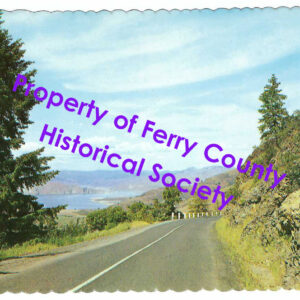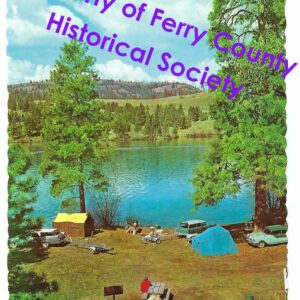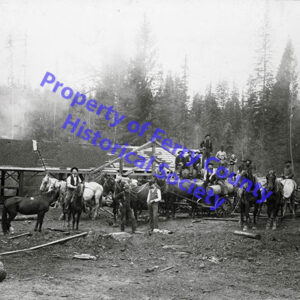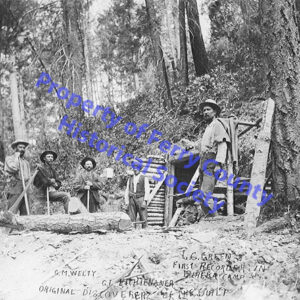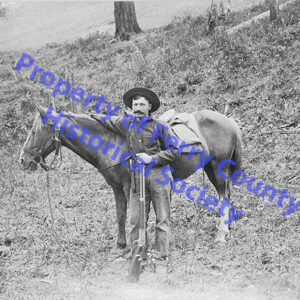Museum Gets Facelift
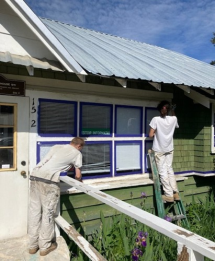 The first week of June saw Curlew Job Corp converging on the Town of Republic for a massive cleanup. The Whitaker-Fletcher museum property underwent the removal of old wood, rocks, and a broken picnic table. Corpsmen cut and raked the grass around the entire lot. At the same time, students from the painting apprentice program scraped and painted the windows and railings at the front of the museum.
The first week of June saw Curlew Job Corp converging on the Town of Republic for a massive cleanup. The Whitaker-Fletcher museum property underwent the removal of old wood, rocks, and a broken picnic table. Corpsmen cut and raked the grass around the entire lot. At the same time, students from the painting apprentice program scraped and painted the windows and railings at the front of the museum.
Another group of Job Corps students removed bricks from around the foundation of the Slagle House Museum in preparation for preservation scheduled for this summer. The Ferry County Historical Society board would like to thank the Curlew Job Corps students for their hard work and willingness to help with these project.
Rock Wall Completed
For the past year, Ferry County Historical Society has been working on replacing the back wall of the garden area on the Slagle property. The wall is replacing a soil stabilizing wall that had fallen into disrepair and was entirely located on the property. The completion of the wall will allow FCHS to move forward with further site prep work and construction of the foundation for the relocation of the Kauffman Cabin. Earlier this year, FCHS received an anonymous gift designated to be used for the move of the cabin from its present location to the Slagle site. This site will ensure future museum patrons a safer means to view the cabin.
The new wall was constructed by (Snowy) David Skowronck, with help from Cliff Cahoon. Snowy is a local mason, well known for his stone work. Cliff has been a valuable volunteer for FCHS over the years. He has lent his tractor for this project to help manage the large base rocks. Some of the larger rocks took both men to edge them into place. The wall is a typical dry stack. The old wall was a single-stack construction, which eventually failed due to the erosion of dirt from the hill.
Different masons are known for the method they use to style dry stack. The new wall is a combination of single and double stack. The result is a beautiful and efficient retaining wall that surely will last another 100 years.
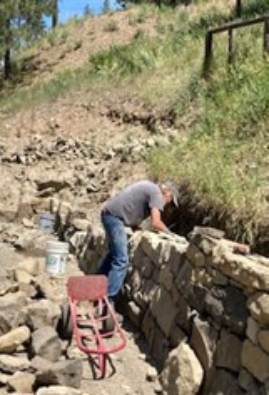
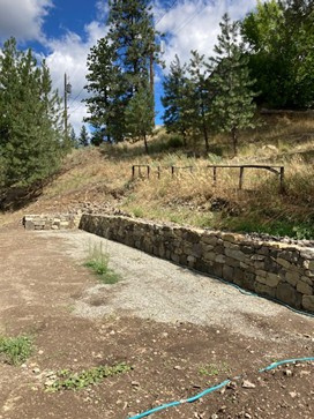
FCHS Members Attend State Meeting
Ferry County Historical Society board members. Jayne and Jay Jurgensen, along with Nancy Morris, attended the Washington State Museum Association’s annual meeting in Chelan, Washington. They were able to meet with museum operators and historical societies from across the state. They attended classes on fundraising techniques, programs in conjunction with tribal entities, and museum management.
The Historical Society’s application was selected out of hundreds Statewide. These Board members were able to attend the conference through the volunteer Museum Learning Community (VMLC) program. Our application was selected last fall to be one of eight historical societies across the state to participate in this pilot program, which is offered by the Washington Museum Association and the Washington State Historical Society.
I Remember ………………
By Bryan Bremner and Edited by Nancy Morris
The Bremner Family came from the far north of Scotland. Alexander Bremner Sr. was a farmer (crofter) and the father of five girls and three boys. The first son, William, born in 1863, was the heir, so he inherited the croft. The second son, John Manson, born in 1864, was the spare, so he wasn’t guaranteed anything. He would become the father, grandfather, etc. to most of the Bremners in Ferry County. The third son, Alexander, born in 1868, grew up on the family croft but was apprenticed to a dry goods store at the age of 13 for six years. He immigrated to America in 1887, having completed his apprenticeship.
Alexander landed in Boston, where he worked for a dry goods merchant for a year. He paid back a loan from a friend and saved up enough for a small stake and a train ticket across the country. After a year of prospecting and mining around Conconully, he moved to Deer Park, where he logged for a while. Then, he returned to his training and started work at Dunston’s dry goods store in Spokane. He and four friends with similar training later opened the Emporium on Riverside in Spokane. This was a boom-town era for Spokane. Between 1895 and 1910, mines in the Silver Valley of Idaho and Ferry County produced high-quality silver, gold, and other metals. Mine owners, workers, and their families were finally able to afford luxuries, and the Emporium supplied them.
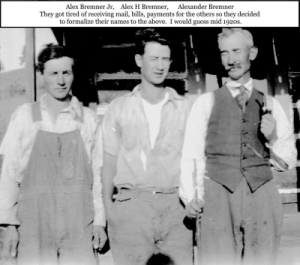 In 1897, Alexander and Allie Huntoon were married. Shortly thereafter, they moved to Cascade, BC, a mile north of the US-Canada border on Highway 395 where the Emporium opened a branch store when the railroad came through. Alexander managed the store there for 2 years before returning to Spokane, where their first son, Alex H. (Dutch), was born in 1901. Their second son, Karl, was born in June of 1903, but died at 11 months of meningitis. On July 6, 1903, Alexander left for a three-month trip to Wick, Scotland, to visit his parents and purchase goods for the firm. During this time, he visited his family and offered to find a place for his brother John to settle in America, where employment prospects were better.
In 1897, Alexander and Allie Huntoon were married. Shortly thereafter, they moved to Cascade, BC, a mile north of the US-Canada border on Highway 395 where the Emporium opened a branch store when the railroad came through. Alexander managed the store there for 2 years before returning to Spokane, where their first son, Alex H. (Dutch), was born in 1901. Their second son, Karl, was born in June of 1903, but died at 11 months of meningitis. On July 6, 1903, Alexander left for a three-month trip to Wick, Scotland, to visit his parents and purchase goods for the firm. During this time, he visited his family and offered to find a place for his brother John to settle in America, where employment prospects were better.
I do not have the records of John Manson Bremner and his family’s travel to America, but I believe that John and his older boys came ahead to prepare a home for his wife Helen and the younger children. John arrived between 1906 and 1908. Karl Kenneth was born in Scotland in May 1906. George was born in Republic in November 1909 and Leonard in Jan 1912.
My grandfather Alexander probably became acquainted with the land in Ferry County during his time in Cascade, BC. He bought property around the north end of Curlew Lake and probably leased it out until his brother John was able to come to America and purchase it in his own name. During this time Allie Bremner became ill with Bright’s Disease (now called nephritis) and Alexander sold his interest in the Emporium to care for Allie. With the proceeds from the Emporium he bought and sold property, primarily around Curlew Lake. Allie died in 1914. Dutch finished high school in Spokane and started at WSC where he went for 2-3 years. Then one night he got a phone call from his father, “Come home quick, we are ranchers!”. A property that Alexander owned the mortgage on had declared bankruptcy, and there was nobody to take care of the cows. That was the end of Dutch’s college career and the beginning of his ranching career.
Alexander has been a popular name among the Bremners since the 1700s and probably earlier. After Alexander and Dutch Bremner moved to the Republic, there were three Alexander Bremners; they started getting each other’s mail. They decided that my grandfather would be Alexander Bremner, my father would be Alex H. (or Dutch) Bremner, and John’s eldest son would become Alex Bremner Jr. Not very profound, but it solved the problem with the Post Office.
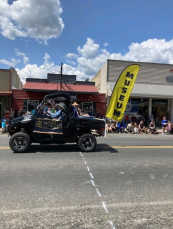
Prospectors Days Parade
Board members Debbie Almquist and Amy Sharbono represented the Ferry County Historical Society in the Prospectors Day Parade. They donned costumes from the period and rode in Debbie’s decorated 4- wheeler, with our yellow museum flag flying off the back. It was great to see our Historical Society represented at the local festival, thanks to our newest members.
